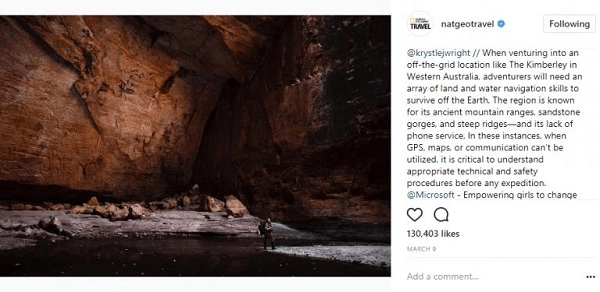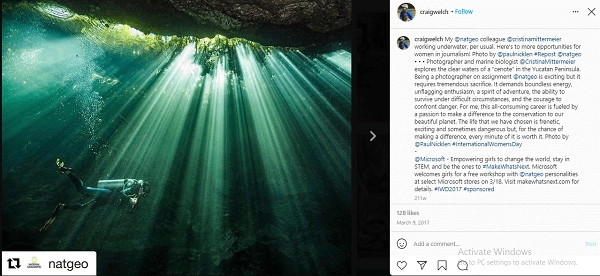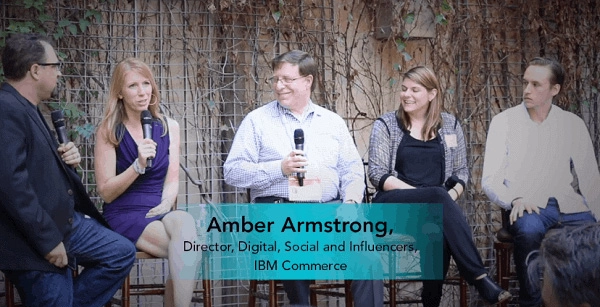
Introduction
Are you looking for effective ways to boost website traffic and attract new customers? Or do you want to generate more B2B leads and sales from your website and social media profiles? Wouldn’t it be great if there was a cost-effective way to reinforce your brand reputation and trust?
Is your answer to any of the above questions a thunderous “yes”? Then it’s high time you start leveraging influencer marketing to promote and grow your B2B business.
If you’re still wondering whether your business needs an influencer marketing strategy in 2021, you’ve already fallen behind your competitors. Every business, irrespective of its size and niche, must leverage the reach and credibility of relevant influencers.
It’s particularly crucial because traditional advertising channels, such as television commercials and radio ads, have become expensive. This has compelled businesses to resort to various digital marketing techniques, such as social media marketing and pay-per-click advertising.
However, this means your target audience is already saturated with a plethora of digital marketing campaigns and promotional content. If you want to cut through this noise, you must effectively utilize influencer marketing to reach your audience.
But here’s the thing – B2B influencer marketing isn’t as simple as getting reality TV stars to recommend your brand or product on Instagram. It requires a well-defined approach to build enduring influencer relationships and collaborate with them to create remarkable content.
In this blog, we’ll outline the steps to develop a rock-solid B2B influencer marketing strategy. But let’s first take a closer look at the concept of influencer marketing and understand its importance for B2B business.
What Is Influencer Marketing?
Simply put, influencer marketing is the technique of promoting your business and products/services by collaborating with influencers. Unlike mainstream celebrities, new-age influencers share a personal connection with their followers.
Businesses can harness this friendly rapport between influencers and their followers to expand their reach and build credibility. This is because today’s consumers are more likely to trust recommendations by another person than self-promotional branded advertising.
And when the recommendation comes from an industry authority, it becomes even more reliable and irresistible. According to the latest research, 61% of consumers are likely to trust social media recommendations from their friends, family members, or favorite influencers.
On the contrary, only 38% of consumers report that they’d trust recommendations from brands on social media. This is even more crucial for B2B companies because such companies have to work harder to establish clout and trust.
It’s because the average B2B order value is often quite high. Also, closing B2B sales involves persuading senior-level decision-makers in business organizations. These officials are often more skeptical and weigh multiple options before spending their company’s funds. That’s why they’re more inclined to trust word-of-mouth referrals from people they already know and trust.
Influencer Marketing in The B2B Context
It’s essential to understand that B2B influencer marketing isn’t as simple as collaborating with a lifestyle blogger to host a product giveaway.
This is because B2B influencers aren’t restricted to social media platforms and blogs. Instead, they include:
- Podcasters
- Entrepreneurs
- Thought leaders
- Authors
- Keynote speakers
- Researchers
If you want to associate these authoritative figures with your brand, you’ll have to first build a strong rapport with them. Next, you need to find out the best way to showcase your brand to their audience. Also, you have to watch out for potential conflicts of interest for the selected influencers.
Many successful B2B brands, such as IBM and Microsoft, have leveraged the power of influencers to grow their business. If you’ve been contemplating working with influencers in your niche, it’s high time to take action.
But let’s first explore the benefits of influencer marketing for B2B businesses.
Why Should B2B Businesses Focus on Influencer Marketing?
Every business, irrespective of its target demographic, is screaming for the attention of its potential customers. Social media platforms, company blogs, search engines, email – every online communication is flooded with content and marketing campaigns.
In such a scenario, consumers become increasingly skeptical about trusting brands that blow their own trumpets. This is where an influencer steps into the picture. Owing to their rapport and reputation, influencers can effectively shape and guide their followers’ purchase decisions.
Let’s say you’re running a digital marketing company and are looking for a reliable keyword research tool. You come across a self-described “feature-rich” tool in a sponsored Facebook ad. You chance upon another software that’s featured in a leading podcaster’s content.
Which tool are you more likely to trust and purchase? If you’re like most business leaders, you’ll choose a product that’s already been trusted by authoritative figures in your industry.
Thus, collaborating with the right influencers will help you grab the attention of your potential customers and win their trust.
Also, it can be instrumental in skyrocket organic website traffic and generating qualified leads. When judiciously implemented, an influencer marketing strategy will also help you drive conversions and increase revenue.
The best part is that you don’t have to worry about targeting and engaging the right audience. The influencer has already done that hard work on your behalf. All you have to do is ensure that your products/services resonate with the influencer’s audience.
B2B Influencer Marketing: An Example
One of the most successful examples of B2B influencer marketing is Microsoft’s Make What’s Next campaign in 2017. The tech giant partnered with National Geographic to launch an Instagram campaign on the occasion of International Women’s Day.
Microsoft’s objective was to promote their #MakeWhatsNext events to encourage more women to participate in STEM disciplines. The company collaborated with National Geographic to publish 30 images by well-known photographers on the latter’s Instagram profiles.

Image via Instagram
Each image featured the story of a female adventurer, explorer, or photographer. Apart from the 5 official Nat Geo Instagram profiles, the content was also shared by other influencers.

Image via Instagram
The outcome was a resounding success with the pictures garnering a whopping 3.5 million likes on the first day. Also, the first day saw more than 1,000 user-generation Instagram posts with #MakeWhatsNext.
It resulted in a total of 150 million social and digital impressions across National Geographic’s distribution channels.
Ultimately, the campaign helped Microsoft reach more than 90 million people while reinforcing their brand reputation.
What Do The Numbers Say?
Influencer marketing offers a high ROI. In fact, every dollar you invest in an influencer marketing campaign delivers an average return of $6.5. That’s higher than the ROI of other commonly used digital marketing techniques.
It isn’t surprising that nearly 60% of marketers intend to increase their influencer marketing in the next year.

Image via Tomoson
Thus, effective influencer marketing can help B2B business with the following:
- Brand building
- Audience engagement
- Lead generation
- Customer acquisition
- Customer retention and loyalty
If you’re running a B2B business, developing and implementing a result-oriented influencer marketing campaign is no longer an option. It’s the only way you can cut through the competition and reach your potential clients.
But where do you get started with building a B2B influencer marketing strategy? How can you find the right influencers for your business? What type of content should you create for your campaign?
In the following sections, we’ll delve deeper into the intricacies of planning and implementing an influencer marketing strategy for B2B businesses.
How to Build a B2B Influencer Marketing Strategy?
Developing an influencer marketing strategy requires you to have a deep understanding of your potential clients.
This is all the more crucial for B2B businesses. The last thing you want is to dilute your branding by collaborating with the wrong influencers.
Here’s a handy step-by-step guide to help you develop an influencer marketing strategy for your B2B business:
1. Set Your Goals & KPIs
You can’t execute a marketing campaign without knowing why you’re doing it. In other words, you need to establish well-defined goals for your campaign.
Are you looking to reach more paying customers? Or do you just want to strengthen your reputation and authority in the industry? Or do you want to drive more registrations for an upcoming event?
Your answers to these questions will determine the end goals of your influencer marketing strategy. Make sure your goals are specific, measurable, and realistic. Avoid setting immeasurable or impractical goals, such as “increasing brand awareness” or “retaining more customers”.
Once you’ve defined your objectives, the next step is to assign suitable key performance indicators (KPIs) to each goal.
KPIs are measurable milestones or metrics that help you assess if and when you accomplish a specific goal. They’re crucial for evaluating the performance and ROI of your campaign.
2. Define Your Budget
It’s worth mentioning that collaborating with an influencer involves a financial transaction. This is particularly important for B2B businesses because your target influencers include established thought leaders, speakers, and other authority figures.
Typically, these people will charge a fee for promoting your brand/products. Also, you’ll have to invest money to create and promote the content. This could involve various things, including procuring the right equipment and software for content creation.
That’s why it is essential to set aside a dedicated budget for your influencer marketing campaign. Make sure you factor in various expenses, including advertising and promotion costs, as well as research and analysis tools.
3. Find Existing Brand Advocates
This is likely the most crucial step of developing any influencer marketing strategy. As a ground-rule, you should focus on collaborating with influencers who are relevant to your niche.
If you’ve developed an AI-powered CRM platform, you can’t ask lifestyle bloggers to promote your product.
Instead, you have to find influencers whose audience needs a new-age CRM tool to grow their business.
Before you start looking for powerful thought leaders in your niche, try looking for existing brand advocates. There are two ways of doing this. The first approach involves utilizing your employees’ reach and influence to promote your business.
Think about it – your employees are the ones brainstorming round-the-clock to develop new products.
No one knows the ins and outs of your brand better than your own people. Therefore, when they share information about your business on their social networks, it’s bound to garner traction.
IBM has mastered the art of employee advocacy by encouraging its people to share insightful tweets about its latest products and innovations.
Amber Armstrong, Director of Digital, Social, and Influencers, at IBM commerce has described how such custom tweets help grow the brand.

Image via DynamicSignal
Alternatively, it’s a wise idea to harness your existing clients to grow your business through influencer marketing.
They’re already familiar with the benefits of using your products/services. When they recommend your brand on their websites or social media profiles, it’ll come across as authentic and trustworthy.
Apart from being effective, this approach saves you the hassle of targeting and nurturing long-term influencer relationships. Also, it can significantly reduce the budget of your marketing campaigns.
Something as simple as a client highlighting their success story and journey with your brand in a video can be compelling and convincing. This is precisely the strategy Okta, an identity management solution provider, has used to attract potential clients.
Here’s a video of one of Okta’s clients explaining how the company’s solutions help them overcome various business challenges:

Image via Okta
Another clever tactic is to identify industry leaders, content creators, and speakers who are already talking about your brand. Maybe they’re already tagging your brand in their social media posts. Or they could be mentioning your product in one of their blog posts.
Alternatively, they might use your branded hashtag on their social media profiles. You can use social listening tools, such as Mention and Keyhole, to track such mentions. Also, it’s a good idea to watch out for influencers who are working with your competitors. You can even take advantage of influencer marketplaces like Shoutcart to find relevant influencers who cater to the B2B niche.
4. Identify Influencers Your Clients Already Follow
Wouldn’t it be great if recommendations for your products come from influencers who your existing and potential customers are already following?
It’ll go a long way to enhance the credibility and impact of the content you create with the influencer.
The best way of spotting such influencers is to hear it from the horse’s mouth. This means you need to ask your audience which social media influencers and industry or thought leaders they look up to.
Start by identifying the top influencers, bloggers, and leaders in your niche. Next, conduct a Twitter poll or email survey asking your audience to rate these influencers on various parameters, including trust and value.
5. Look Beyond Social Media
When it comes to finding B2B influencers, you need to expand your search beyond mainstream social media platforms. Identify established thinkers, authors, speakers, entrepreneurs, and podcasters who are relevant to your niche.
While such personalities may not have millions of Instagram followers, chances are they’ve captivated your clients with their groundbreaking ideas and innovations.
6. Analyze Target Influencers
This step involves evaluating the potential influencers in terms of their:
- Reach on social media
- Audience engagement rates
- History of brand collaborations
- Presence on digital channels other than social media
- Top-performing content
Also, you should take a look at their audience demographics and find out whether it resonates with your target clients.
Analyze the type of content they’re publishing to determine whether it’ll resonate with your niche. Make sure you collate all this information in a dossier to provide easy access to all team members.
7. Nurture Influencer Relationships
Once you’ve spotted the influencers you want to collaborate with, you need to build a strong rapport with them. This process becomes easier when you work with an influencer who is already familiar with your brand and products.
Otherwise, you’ll have to start from scratch. This involves engaging with the target influencer’s blog and social media posts.
Share their blog posts on your social media profiles or leave a comment on one of their Instagram posts. Likewise, you could mention them in relevant tweets or Facebook posts.
The idea is to organically grab the influencer’s attention before you approach them for a collaboration. You could also try featuring them in your content. For instance, you could use statistics or examples from their blog posts in your articles.
Alternatively, you could do a piece on market trends and predictions and ask relevant thought leaders to share their insights. It can lay the foundation for a strong partnership.
8. Attract Potential Influencers with Top-Notch Content
This is another powerful way of approaching B2B influencer marketing. Instead of reaching out to established influencers in your industry, you can position your brand as a leading content creator.
This, in turn, will tempt industry leaders, authors, and other respected personalities to collaborate with you. Of course, the prerequisite is that you must build your audience by publishing outstanding content.
This is the strategy that Joe Pulizzi uses for the annual Content Marketing World conference. The event has become such a renowned name in the industry that speakers, marketers, and content creators want to associate with it.
Instead of reaching out to influencers, the conference invites entries from interested speakers.

Image via Content Marketing World
9. Educate Your Influencers
Irrespective of the time of content you co-create with an influencer, it must be authentic, valuable, and insightful.
The only way of ensuring this is to familiarize them with your brand. Start by sharing your values and vision with them.
Also, give them extensive information about your product/services, company history, and clients. The key is to engage them with your brand and make them equally passionate about your marketing goals.
10. Ensure Creative Freedom
If you want your campaign to succeed, it’s crucial to let the influencer come up with ideas to best showcase your brand.
From podcasts and educational videos to guest posts and events – there are various avenues for collaborating with influencers.
However, you should let them pitch content ideas instead of forcing your views and opinions on them. It’s essential because they’ve got a deeper understanding of the preferences and pain points of their audience.
11. Don’t Hesitate to Experiment
Don’t be afraid of breaking the conventions of B2B influencer marketing to develop original and insightful content. Avoid turning it into a boring sales pitch. Instead, utilize various types of media to engage your message. Also, devise creative ways to promote the content.
Take LinkedIn’s “Great Stories of Content Marketing” campaign for instance. The leading professional networking site asked marketing influencers to do a dramatic reading of their favorite, recent blog post(s) related to digital marketing.
Then, the company compiled all readings and published them as “Festive Audio Playlist”.

Image via LinkedIn
12. Watch Out for Influencer Conflict
It’s worth noting that many B2B influencers have established their own companies or ventures. Thus, promoting another brand might cause a conflict of interest in their work ethics.
You must have a transparent discussion with the influencer about any potential conflicts before you start working on the campaign.
13. Monitor & Measure
Lastly, keep an eye on your KPIs to determine whether your influencer marketing campaign is delivering the desired results.
You can use various monitoring tools, such as Google Analytics, Buffer, and Google Keyword Planner for this purpose. Also, keep an eye on the analytics section of your social media profiles.
Final Thoughts
It’s 2021 and you shouldn’t be asking “why” your B2B business needs an influencer marketing strategy. Instead, you should focus on how to grow your business and attract new customers using a powerful influencer marketing strategy.
It can be instrumental in building your brand and establishing it as an industry authority. Also, it’s an excellent way to break into new marketers.
But you should remember that B2B influencer marketing requires a more concrete and calculated approach than its B2C counterpart.
The most crucial step is to find influencers whose audience will immediately relate to your brand.
Try leveraging employee advocacy and user-generated content for this purpose. Alternatively, you can position your brand as a leading content creator to attract potential influencers.
Do you have any other useful influencer marketing tips for B2B businesses? Share your suggestions in the comments section below.
Our blog
Latest blog posts
Tool and strategies modern teams need to help their companies grow.

To build a marketing strategy that drives real results, you need more than creative i...

The 95/5 rule in B2B marketing shows that while only 5% of buyers are ready to purcha...

Running a business comes with its own set of challenges, especially when it comes to ...







